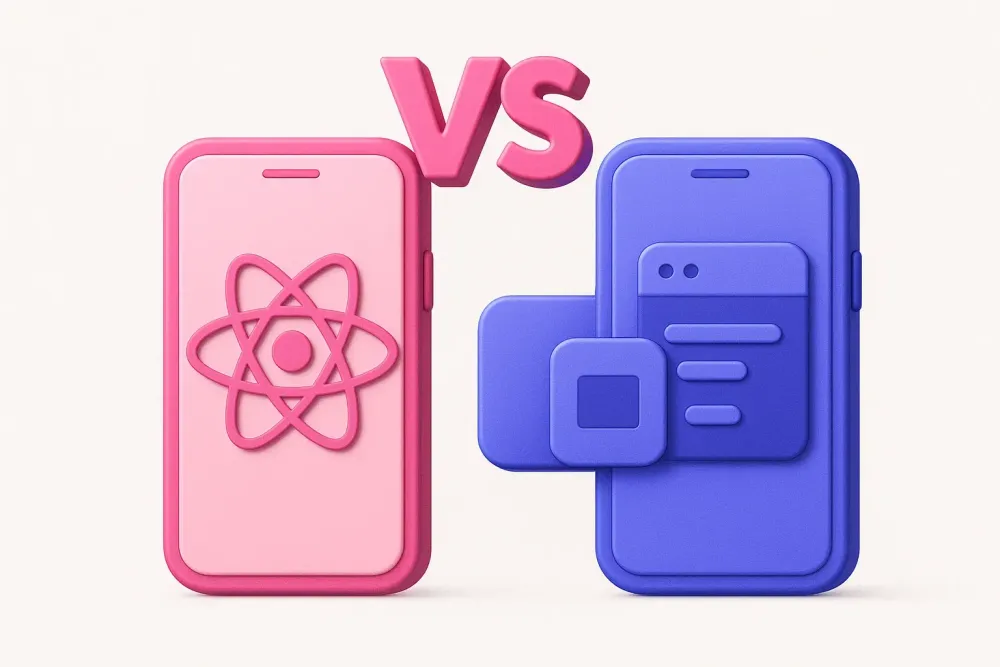Home
Services
Products
Projects
Who We Are
Blogs
Contact Us

React Native vs. Hybrid Apps: Why Startups Choose React Native
The debate between React Native and Hybrid apps for startups has been ongoing since React Native's emergence in 2015. The core question isn't about platform efficiency, but rather which platform best aligns with a startup's need for rapid development, high quality, and cost-effectiveness. Some argue that hybrid apps, built by web developers using web technologies, offer faster development cycles and lower costs compared to native development. They highlight the reduced time investment and the ability to achieve cross-platform presence with a single codebase.
While these advantages of hybrid apps are valid – wider audience reach, potential for offline functionality, and suitability for apps without demanding graphical requirements – they come at a cost. Startups must carefully consider the potential compromises in features and performance that impact user experience. Choosing hybrid might lead to critical questions:
Will users tolerate an unresponsive or slow app?
Will an iOS user accept an app that resembles an Android app (and vice versa)?
The answer is typically a resounding "no." Beyond these surface-level concerns, several deeper issues differentiate native and hybrid app development.
Challenges with Hybrid App Development
- Performance Limitations: Hybrid apps introduce an extra layer between the source code and the target platform, inherently impacting performance. While the degree of impact varies, Facebook's migration from HTML5 to React Native speaks volumes about the potential performance gains for large-scale applications.
- Debugging Difficulties: The added layer in hybrid apps complicates debugging. Developers rely on framework interaction with the target OS, hoping no new bugs are introduced. Furthermore, developers might not possess a comprehensive understanding of the platform, making issue identification time-consuming.
- User Management Complexities: Gathering usage and performance metrics, crucial for app improvement, can be challenging in hybrid apps. Implementing login screens can hinder engagement and increase bounce rates.
- Limited 3D Graphics Support: Native apps excel in 3D graphics and visually rich designs. Hybrid apps lack this inherent capability, requiring additional effort and third-party tools like Unity 3D to bridge the gap.
- Difficulty Integrating New Features: Startups thrive on innovation and leveraging the latest features. Hybrid frameworks often struggle to incorporate new capabilities quickly, hindering a startup's ability to stay ahead of the curve.
Enter React Native: A Superior Alternative
React Native offers a compelling alternative for startups seeking quality without sacrificing speed or budget. It addresses the shortcomings of hybrid apps, providing several key advantages:
Top 10 Benefits of React Native
- Native Look and Feel: React Native utilizes the same fundamental UI building blocks as native iOS and Android apps, resulting in a seamless user experience. Hybrid apps, being essentially web views wrapped in native containers, cannot match the fluidity and performance of React Native apps.
- Cross-Platform Code Sharing: React Native's "write once, run anywhere" nature allows startups to develop high-performing apps for both iOS and Android from a single codebase, significantly reducing development time and cost. At Defx, we've consistently achieved over 80% code reusability across platforms.
- Leveraging ReactJS Programming Model: React Native's foundation in JavaScript and its shared programming model with ReactJS provide significant advantages. Startups can leverage existing web development expertise and streamline their team structure.
- Thriving Ecosystem: React Native boasts a vibrant open-source community and a wealth of resources, enabling external integrations and knowledge sharing. It has quickly become the leading choice for modern cross-platform development.
- Powering Industry Leaders: The adoption of React Native by major players like Instagram, Facebook, Tesla, Bloomberg, and Walmart demonstrates its robustness and market relevance.
- Native Rendering with Reusable Components: React Native moves beyond WebView limitations by employing reusable native components that compile directly to native code. This modular approach allows for faster development cycles and a more native user experience.
- Intuitive User Interface: Compared to other JavaScript frameworks, React Native’s mobile-centric approach results in highly responsive and fluid UIs, enhancing user engagement.
- Seamless Third-Party Plugin Integration: React Native supports third-party plugin connectivity, allowing startups to bypass WebView limitations and access native modules directly, like integrating Google Maps seamlessly.
- Cost-Effectiveness: The single codebase and cross-platform capabilities of React Native significantly reduce development time, translating into lower development costs – a crucial advantage for startups.
- Native Component Reusability: React Native's component-based architecture fosters code reusability, aligning with platform-specific design guidelines and best practices, resulting in high-performing, native-like applications.
The Final Decision
For startups facing time and resource constraints, React Native offers a compelling path to reach a wider audience with a high-quality product. Contact Defx to discuss your project and leverage our React Native expertise.
FAQs: Why React Native Excels
Q: What differentiates React Native from Hybrid Apps?
Unlike hybrid apps running within web views, React Native apps function natively, eliminating the performance bottlenecks associated with web-based UI elements and JavaScript interpreters.
Q: What advantages does React Native offer startups?
Key benefits include reduced development effort, faster time-to-market, lower development costs, and a native app-like experience.
Q: How has React Native superseded Hybrid Apps?
React Native surpasses hybrid apps by delivering superior performance and quality, impossible to achieve with WebView-based frameworks.
See More
Contact Us
Let’s make your Idea into Reality
Let's Talk
© Copyright DEFX. All Rights Reserved
GoodFirms ★ 4.2
Clutch ★ 4.2
Google ★ 4.2
